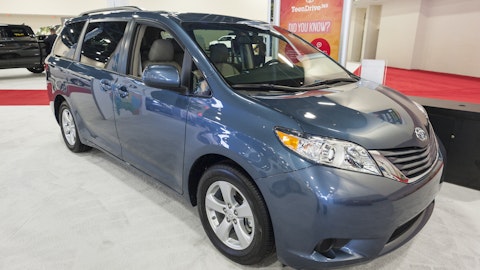David Hult: Rajat, I’ll add to that. We have a large wholesale parts operation that it’s starting to impact as well because we’re not able to deliver those parts to our customers. So that’s concerning. So every week that goes by, where it’s affecting our business, we saw this coming. Our parts managers were strategic and built up the inventories as best they could to prepare for this. And we came into it with a decent day supply of vehicles with all the brands. But as you can imagine, as these weeks go on and they shut down certain plants, it’s going to impact us in the fourth quarter. To what degree at this point, it’s hard to determine, but we’re certainly starting to feel it. And as far as coming back, just real quickly, as far as coming back, that’s a hopeful thing. Either the consumer gets frustrated and trades the vehicle for another brand or they wait it out, you really just don’t know what that’s going to look like to get to the other side.
Rajat Gupta: Got it. Got it. That’s helpful color. Just last one. I believe, Mike, I think in your prepared remarks, you mentioned that you expect the leverage for the company to go to the mid-2s with the Jim Koons deal? And then you mentioned you expect to get it back down to less than two times by the end of 2024. Is that implicitly suggesting some sort of earnings cadence for next year? I mean, if you were able to get to less than two times by the end of next year, it would suggest that you’re expecting EBITDA for the company, including Jim Koons, to grow next year. Is that like an unreasonable assumption? Are we missing something there in your statement there? Any thoughts would be curious.
Michael Welch: No. That’s more of a cash flow issue. We’re going to prioritize cash to paying down debt. And so that’s just taking the cash flow that we’ll have next year and using that to pay down the debt level that will take the net debt level that we’ll take on as far as the Koons acquisitions.
Rajat Gupta: Got it. Got it. But is that — there’s an implicit EBITDA assumption there, like in the 2x…
Michael Welch: There’s an EBITDA assumption in there. I mean it’s — it takes the same-store EBITDA assumption with lower margins next year. But then add to that, Koons cash flow is going to come with it. And so while same-store will be backwards a little bit because of the decline in new vehicle margins, we’ll get a lift because of the — adding the Koons EBITDA.
Operator: [Operator Instructions] Our next question comes from Ryan Sigdahl with Craig-Hallum Capital Group. Please proceed.
Ryan Sigdahl: Morning, guys. I want to start with TCA. Can you talk a little bit more about maybe accounting nuance. Looking at ex profit, you expected $25 million started this year than it was 75, now 85. I guess, is that primarily a timing of when Asbury stores are rolling on to TCA? Or is there some other underlying assumption in their business impact? And then can you also talk maybe magnitude of negative impact next year?
Michael Welch: Yes. So two things in there. When we originally had the $25 million forecast, we expected higher used vehicle and new vehicle volumes for this year. And so as those came in less, we’re in effect rolling off LHM stores for 2018 and ’19. That’s the income that’s kind of rolling off as far the deferral. And we’re replacing it with less of a hit for this year because of the volumes being lower. So that’s a big chunk of it. And then the other piece is we did our large groups in Georgia and Florida where we have a lot of our volume for Asbury. The Georgia ones are fully rolled out. The Florida ones, we’re going to go out this in the fourth quarter. We delayed that until the first quarter just with the Koons acquisition and some other things, just decided to push that off to the first quarter versus trying to stick it in during the holidays in the fourth quarter.




